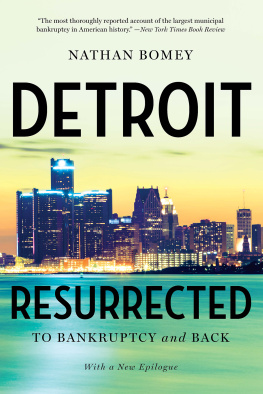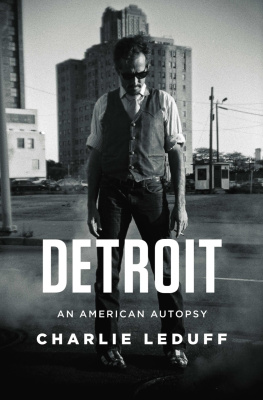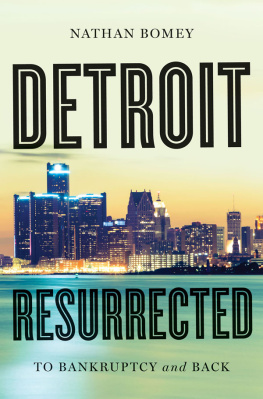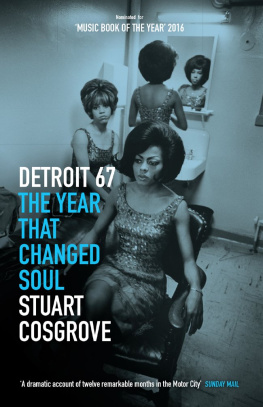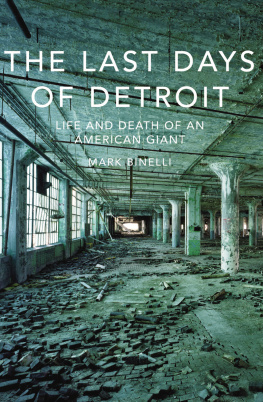Claire W. Herbert - A Detroit Story
Here you can read online Claire W. Herbert - A Detroit Story full text of the book (entire story) in english for free. Download pdf and epub, get meaning, cover and reviews about this ebook. publisher: University of California Press, genre: Politics. Description of the work, (preface) as well as reviews are available. Best literature library LitArk.com created for fans of good reading and offers a wide selection of genres:
Romance novel
Science fiction
Adventure
Detective
Science
History
Home and family
Prose
Art
Politics
Computer
Non-fiction
Religion
Business
Children
Humor
Choose a favorite category and find really read worthwhile books. Enjoy immersion in the world of imagination, feel the emotions of the characters or learn something new for yourself, make an fascinating discovery.
- Book:A Detroit Story
- Author:
- Publisher:University of California Press
- Genre:
- Rating:5 / 5
- Favourites:Add to favourites
- Your mark:
- 100
- 1
- 2
- 3
- 4
- 5
A Detroit Story: summary, description and annotation
We offer to read an annotation, description, summary or preface (depends on what the author of the book "A Detroit Story" wrote himself). If you haven't found the necessary information about the book — write in the comments, we will try to find it.
A Detroit Story — read online for free the complete book (whole text) full work
Below is the text of the book, divided by pages. System saving the place of the last page read, allows you to conveniently read the book "A Detroit Story" online for free, without having to search again every time where you left off. Put a bookmark, and you can go to the page where you finished reading at any time.
Font size:
Interval:
Bookmark:
Permission to reprint has been sought from rights holders for images and text included in this volume, but in some cases it was impossible to clear formal permission because of coronavirus-related institution closures. The author and the publisher will be glad to do so if and when contacted by copyright holders of third-party material.
Claire W. Herbert

UNIVERSITY OF CALIFORNIA PRESS
University of California Press
Oakland, California
2021 by Claire W. Herbert
Cataloging-in-Publication Data is on file at the Library of Congress.
Library of Congress Cataloging-in-Publication Data
Names: Herbert, Claire W., 1984 author.
Title: A Detroit story : urban decline and the rise of property informality / Claire W. Herbert.
Description: Oakland, California : University of California Press, [2021] | Includes bibliographical references and index.
Identifiers: LCCN 2020034104 (print) | LCCN 2020034105 (ebook) | ISBN 9780520340077 (hardcover) | ISBN 9780520340084 (paperback) | ISBN 9780520974487 (ebook)
Subjects: LCSH : HousingAbandonmentMichiganDetroit. | GentrificationMichiganDetroit. | Detroit (Mich.)Economic conditions 21st century.
Classification: LCC HD 7304. D 6 H 47 2021 (print) | LCC HD 7304. D 6 (ebook) | DDC 330.9774/34dc23
LC record available at https://lccn.loc.gov/2020034104
LC ebook record available at https://lccn.loc.gov/2020034105
Manufactured in the United States of America
29 28 27 26 25 24 23 22 21
10 9 8 7 6 5 4 3 2 1
To my family, especially my MBs
PART I
PART II
Dont Think They Know
Frederick Williams
Dont think they know about us
They dont know
That Im a crack baby
A product of that product
Dont think they know that
I was hand crafted by drug dealers
That police kicked in our front door
And put me face down on the floor
That I was told at seven years old not to blink nor flinch
When I seen someone get murdered
I would be murdered
If I snitched
Going to school my clothes had a stench
My clothes had holes and needed stitching
Or stitches
Because my parents didnt give a shit
Or addiction alters ability to make decisions
Dont think they know about them
We know where these drugs come from
Where these guns come from
Where these prisons come from
Dont think they know about us
They dont know
He carry a gun
More than he carry his son
Because people get buried everyday where Im from
We hold grudges because judges only want to
Evict us
Convict us
Restrict us
They dont know
How it feels
being treated like youre about to steal
Or kill
Or both
They dont know what its like to be black
To be black is to be hard
But being black is so hard at times I wanted to turn my back on black
To be black is to be
Not free
Yet to be black is
To be me
I wear a hoodie because Im cool
Because Im cold
Because Im hot
Doesnt mean I deserve to be shot
Dont think they know about us
They dont know
Racial oppression is the root cause of our aggression
Yes Im defensive
Dont think they realize
They paralyze
Us with government assistance
We cant have black power without general electricity
They pass bills through the senate
That makes it impossible to pay bills in the house
Hold
Holding us to a standard they cant stand next to
Policies that shove us into poverty
Dispossessed of property
Atrocities like boarded up houses and abandoned school buildings
Harsh reality for our children
My community is a cemetery
And Im supposed to celebrate February
Dont think they know about us
They dont know
In 2013, while studying informal property use in Detroit, I interviewed Craig, a resident and firefighter who told me we live in an interesting town. If you could weather the storm youll be alright, watch in ten years ... Detroit has certainly changed a lot since I began spending time there in 2008, and many residents in my study were optimistic about the prospects of their city. The timing of my research, from 2011 to 2016, was fortuitous. During our tenure in Detroit, my partner and I witnessed a host of unanticipated but significant changes signaling what may be looked back on as the turning point of Detroit: bankruptcy, the appointment of an Emergency Manager, election of the first white mayor in forty years, massive private investment in Downtown and Midtown by three white billionaire entrepreneurial stakeholders, and the first increase in the white population in sixty-four years. on being gentrifiers, structurally we probably were. This preface is a reflection on my experiences living in and learning about Detroit. The poem at the beginning is by my dear friend and incarcerated artist Fred Williams, born and raised in Detroit until he was wrongly sentenced to life in prison as a juvenile. This poem reminds me of how much, as outsiders or newcomers, we dont know about life in certain parts of Detroit and how much others can teach us if were willing to listen and learn.
Instead, it was called just south of Boston Edison for those who wanted to associate it with the historic districts filled with decadent mansions famously home to Henry Ford and baseball legend Ty Cobbs old houses; The North End by those who wanted to disassociate privilege and align with the urban agri-culture energy in the city; or Near New Center for those hoping to capitalize on the glimmers of gentrification in this area.
Our requirement was that the house be immediately livable, not having the time nor resources for significant rehab (and our bar for livable being quite low). The house we ended up buying was previously squatted, and then renovated and occupied by a white family for fifteen years. It then went through mortgage foreclosure and was resold to us for just over 43 percent of the delinquent mortgage value. The previous owners loved the area so much they moved a block away, and we came to know them well, giving us insight into the house we wouldnt likely have had access to otherwise. The house was enormous and run-down after housing a family of eight for so long, but the bones of the former owners remodel were still in good shapenew windows and roof, working furnace and air conditioners. But the paint was chipping badly, and there were holes in the plaster walls. Of three bathrooms, no single one was fully functional: we had to shower in the basement. But it gave us space to accommodate various friends, family, lodgers, and the occasional stray dog over the years ... We joked that when you have the space you take in guests of all kinds.
In the three years we owned it, the exchange-value of our property increased 258 percent. As young, highly educated white newcomers, we were frequently associated with and viewed as symbols of the changes taking place in Detroit. Some residents viewed newcomers like us with trepidation, as indicators of changes that werent for them and wouldnt benefit them. But many others I spoke with viewed white residents wanting to live in Detroit as an affirmation of the goodness and potential of the city they loved so much. In one interview, a resident explained that having white folks move onto his block would bring resources to the neighborhoodthe police would respond if a white person called, I was told.
Font size:
Interval:
Bookmark:
Similar books «A Detroit Story»
Look at similar books to A Detroit Story. We have selected literature similar in name and meaning in the hope of providing readers with more options to find new, interesting, not yet read works.
Discussion, reviews of the book A Detroit Story and just readers' own opinions. Leave your comments, write what you think about the work, its meaning or the main characters. Specify what exactly you liked and what you didn't like, and why you think so.





